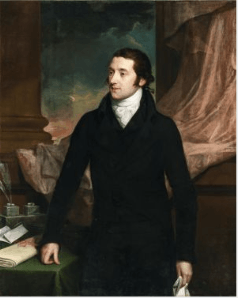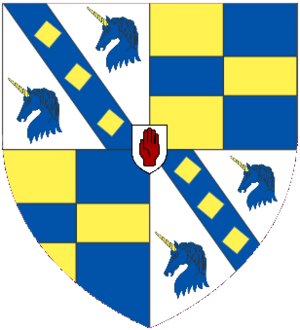Sir William Cusack-Smith, 2nd Baronet facts for kids
Sir William Cusack-Smith (born January 23, 1766, died August 21, 1836) was an important figure in Ireland. He was a judge, a politician, and held a special title called a Baronet. This title meant he was part of a noble family. He was also a Fellow of the Royal Society, which is a group for top scientists.
| Top - 0-9 A B C D E F G H I J K L M N O P Q R S T U V W X Y Z |
Early Life and Schooling
William Cusack-Smith was the only son who lived to adulthood. His father, Sir Michael Smith, was also a very important judge in Ireland. He was the Master of the Rolls, a senior legal position.
William went to famous schools. He studied at Eton College, a well-known boarding school. After that, he went to Christ Church, Oxford, which is a part of Oxford University.
Becoming a Lawyer and Judge
William Cusack-Smith became a lawyer in 1788. He studied law at Lincoln's Inn in London. By 1795, he became a King's Counsel, which is a special title for experienced lawyers.
In 1800, he was made the Solicitor-General for Ireland. This was a high-ranking legal job. The next year, in 1801, he became a Baron of the Exchequer. This meant he was a judge in a special court that handled money matters. He was only 35 years old, which was very young for such an important role.
A Judge with a Unique Style
William Cusack-Smith was known for being a bit unusual as a judge. He sometimes upset people, including a famous politician named Daniel O'Connell.
In 1834, some politicians tried to investigate him. They said he often started court late, sometimes after noon. They also said he talked about politics during his court speeches to juries. While he was not the only judge to do this, his comments were seen as one-sided. However, the attempt to investigate him was eventually stopped.
His Political Views
Even though he was a strong member of the Church of Ireland, William Cusack-Smith always supported Catholic Emancipation. This was a movement to give more rights to Roman Catholics in Ireland. His mother was Roman Catholic, which might have influenced him.
He also changed his mind about the Act of Union 1800. This law joined Ireland and Great Britain. At first, he was against it, but later he supported it. Despite this, many people respected his work as a judge. Even those who wanted Ireland to be separate from Britain praised him when the investigation against him failed.
Time as a Politician
Before he became a judge, William Cusack-Smith was a politician. He was a member of the Irish House of Commons. This was like the parliament for Ireland at the time.
He represented the area of Lanesborough from 1794 to 1798. After that, he represented Donegal Borough. He stayed in this role until the Act of Union 1800 was passed in 1801.
Family Life
William Cusack-Smith added his mother's family name, Cusack, to his own name after she passed away.
He married Hester Fleetwood Berry. They had four children together:
- Sir Michael Cusack-Smith: He became the 3rd Baronet after his father.
- Thomas Cusack-Smith: He followed in his grandfather's footsteps and also became the Master of the Rolls in Ireland, a very important legal job.
- Frances Mary Anne and Mary Anne Angelina: These were his two daughters. Neither of them ever married. Frances, also called Fanny, lived to be 94 years old.
Many letters written by Hester to her family, especially her brother Robert, are still around today.
Family Coat of Arms
 | Anna J. Cooper |
 | Mary McLeod Bethune |
 | Lillie Mae Bradford |



